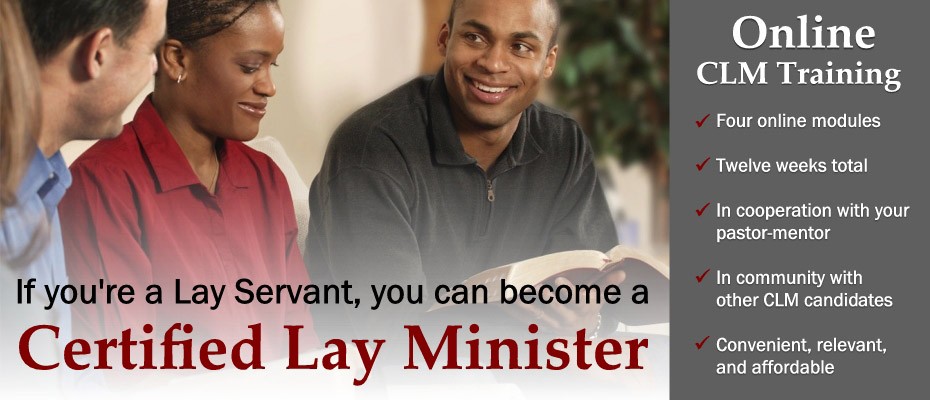
Are you called to Certified Lay Ministry? Do you feel a call on your life to serve within and outside of the walls of the church in cooperation with appointed or assigned clergy? Are you called to lead discipleship programs, accountability groups, or even to help serve small membership churches? If you are currently a Certified Lay Servant or a Certified Lay Speaker and secure approval as outlined below, you are eligible to enroll in CLM 101: Call and Covenant for Ministry and begin a four module learning process that leads to Certified Lay Ministry!
Module One: Call and Covenant for Ministry examines United Methodist theology and ordering of ministry, along with the role of the Certified Lay Minister and other leadership concerns. Alongside fellow students, you will discover how CLMs “fit” into the big picture of ministry in the United Methodist Church and, through conversation with your fellow students and with instructor guidance, you’ll begin the process of discerning your own call.
Requirements:
This course requires the formation of a Mutual Ministry Team consisting of the CLM learner, the CLM’s pastor/pastor mentor, the lay leader within the CLM’s church, the district superintendent or designee, and three to five others from the local church. We strongly recommend that this team be recruited prior to the start of the course in order to meet the course objectives including the completion of a ministry covenant assignment. One-on-one meetings with your pastor mentor are also required to meet the learning objectives during this module.
In addition to Blackboard interactions, 2 required Zoom meetings will be held. The first one will be on the first Monday of the course and the second one will be on the last Friday of the course. The date of the second Zoom session may be adjusted at the discretion of the instructor with input from the course group. The required Zoom meetings are held from 6-8 PM Eastern Time. There will be an alternative assignment for those who cannot attend with the permission of the instructor.
CLM Program Engagement Policy
Active participation is a key requirement for learners enrolled in the CLM program. Students must engage in coursework daily to maintain steady progress.
If a learner misses three or more consecutive days of discussions or assignments without submitting work or communicating with the course instructor, they may be subject to withdrawal from the course. Consistent engagement is essential for success.
Requirements for participation in CLM101 – PLEASE READ CAREFULLY.
- Learners must have completed the Basic Lay Servant Ministries course plus either Rediscovering Our Spiritual Gifts or For the Common Good: Discovering and Using Your Spiritual Gifts, online or locally. Please do not enroll in this course if you have not completed these requirements. Contact your conference office for upcoming Basic courses near you; Rediscovering Our Spiritual Gifts and For the Common Good: Discovering and Using Your Spiritual Gifts are available online.
- Enrollment must be submitted before 5:00pm central time on the Wednesday before the course begins.
- Enrollees must secure approval from their mentoring pastor AND district or conference Lay Servant Ministries director by doing the following:
- Email each of these persons requesting their approval for your participation in CLM101.
- Include the link below in your email so that your requested persons can return their approval using the required form. Right-click on the hyperlink to copy the form link and then paste into your email message. https://scps.formstack.com/forms/clm_approval_form2
- Approvals must be received by the BeADisciple registrar before noon Central time on the Friday before the course begins or the enrollee will be withdrawn and the course fee refunded. The learner will receive an email notification when the approvals are submitted, and it is the responsibility of the learner to follow up if notifications are not received in advance of the deadline.
- For this course, learners will need the 2020/2024 The Book of Discipline of The United Methodist Church | Cokesbury. ISBN 13: 9781791010942. Publication Date: 12/18/2024. A free, searchable pdf is available in the course resources.
This course is eligible for 1.0 CEU.
The CLM Downloadable Resource for Module One will be available within the course.
Quick Info:
Number of weeks: 2
Price: $110
CEUs: 1.0
Required books: No
Blackboard: Yes
Zoom: Yes, required
Certification or Series: Yes (Certified Lay Ministry)
Read course description for details.
New to BeADisciple?
Read how BeADisciple courses work
Price: $110
Past Students Said…
“It really made me think about my call and how it could it into my church. It also helped dene what that role could be,
and made me dive into personal motivation. I enjoyed meeting and talking with the other students in the class. So
many stories!”
“I love the interaction with other participants both during the Zoom calls and the posts within the course. I also
appreciate the feedback from Todd (instructor)!”
“I liked hearing about others call to ministry and how even though many of our callings are similar, many are very different. Each one is using their talent in carrying out God’s call on their lives.”
“I learned how to approach being a CLM, how to engage with clergy about being a CLM and some roles and responsibilities of a CLM.”
“There was a lot of emphasis placed on understanding and writing a covenant that will be used for clarification and understanding between the congregation, DS, pastor and certified lay minister. Module 1 immersed us in the importance of communicating and working with the above mentioned people/group to arrive at a workable covenant.”
“I felt that I was challenged and put to work and not just held out in an anonymous online class.”
“I learned how to be fair in my duties, expectations, and in forming a new work team.”
“I think the thing I learned most was that ministry isn’t just the job of the pastor but that everyone can be involved in some forms of ministry. It takes a village.”






